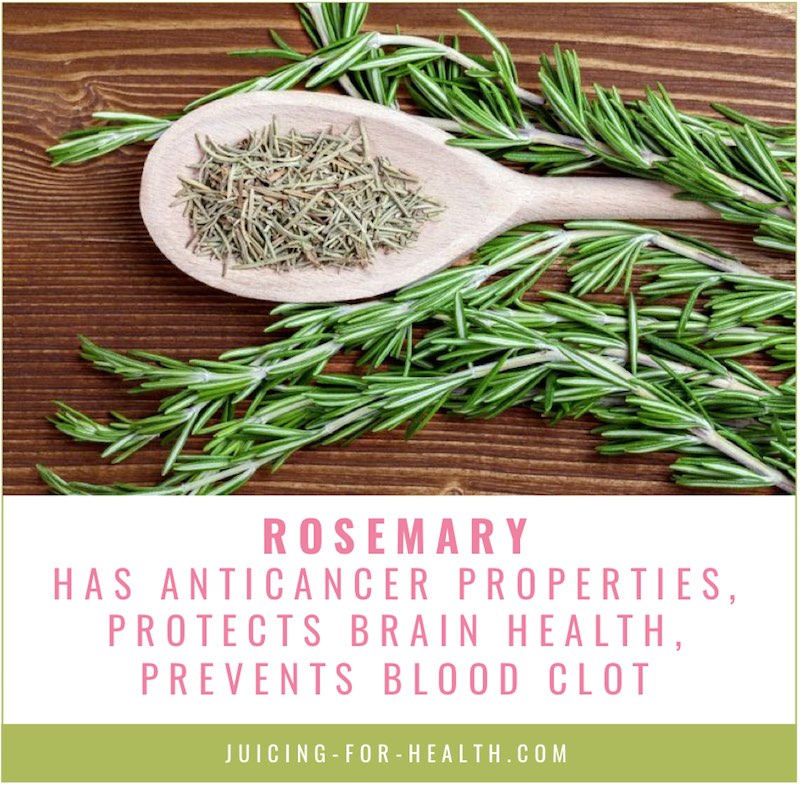Rosemary Has Anti-Cancer Properties, Protects Brain Health, Prevents Blood Clot
Last updated on
Herbal action: cognitive enhancer, thymoleptic (improves mood), sedative, tonic, anti-inflammatory, antimicrobial, anti-platelet
Common name: rosemary
Scientific name: Rosmarinus officinalis
Family name: Lamiaceae (Mint family), genus Rosmarinus
Parts used: mostly leaves, but the stems and roots are also used

Notable Phytonutrients In Rosemary And Their Features
- Terpenes (mainly carnosol, carnosic acid, oleanic acid, and ursolic acid) have antibacterial and anti-inflammatory properties, as well as significant antioxidative potential. Carnosol and carnosic acids are terpenes exclusive to the mint family of herbs, and studies indicate they have anti-cancer and immunomodulatory properties (it boosts the immune system’s power).
- Phenolic acids (caffeic acid and rosmarinic acid being the most prominent) are major antioxidants that help prevent free radical damage, have anti-inflammatory and bacteriostatic (suppress the growth of bacteria). Rosmarinic acid is also responsible for the cognitive boost that rosemary provides, and some other studies indicate it could help in fighting liver fibrosis,
- Flavonoids (luteolin, genkwanin, diosmetin) are another class of antioxidants, and many of them have additional health benefits. For example, luteolin is able to protect the nervous system from neurodegenerative disorders (like Alzheimer’s and Parkinson’s diseases), genkwanin has anti-cancer properties against colorectal cancer and diosmetin is able to suppress prostate cancer.
Medicinal Uses And Health Benefits of Rosemary
Rosemary has been used since ancient times to treat a great number of conditions and diseases, but the most popular of this herb’s uses always has been cognitive enhancement.
In other words, rosemary may help with everything related to brain function, for example:
- Improve memory
- Prevent cognitive decline in the elderly
- Improve mood, fight off anxiety and depression
- Boost perceived energy and reduces fatigue
- Improve sleep quality
And that’s just the tip of the iceberg!
Additional Benefits of Rosemary
- Prevents free radical damage
A lot of the active compounds found in rosemary have significant antioxidative properties, meaning that they prevent free radical damage to the cells and tissues. In turn, this leads to decreased inflammation too.
- Has anti-cancer properties
The main active compounds of rosemary (carnosol, carnosic acid, rosmarinic acid) seem to have significant anti-cancer effects. Studies show they can inhibit the proliferation of ovarian cancer and boost the effectiveness of conventional chemo drugs like cisplatin.
- Protects from UV damage to the skin
A blend of rosemary and citrus flavonoids taken by mouth was confirmed to decrease the harmful effect of ultraviolet radiation to the skin. Basically, rosemary tea is like a drinkable bonus sunscreen! (But don’t forget to use your regular sunscreen as well.)
- Shows strong antimicrobial potential
Multiple active compounds found in rosemary have fabulous antiviral, antifungal, and antibacterial potential. When applied topically, rosemary oil is effective even against such pesky bugs like Propionibacterium acne, the direct cause of acne.
- Improves asthma symptoms
Although rosemary doesn’t cure asthma, studies indicate it could significantly improve its symptoms, particularly cough, sputum production, chest pain, and wheezing.
- Decreases weight gain and accumulation of fat
Rosemary leaf extract seems to inhibit the enzyme of the pancreas that metabolizes fat. The result is that most of the dietary fat you eat will just be excreted, not absorbed and accumulated. Keep in mind that it won’t burn any fat that’s already stored, though.
- Prevents the formation of clots
When you cut yourself, a little clot to fix the wound is a great thing. When these clots are formed spontaneously throughout the body—well, that’s a catastrophe, especially in cases of chronic cardiovascular conditions. Rosemary seems to inhibit the aggregation of platelets, thus preventing blood clots to appear on their own.
- Improves mood and alertness
Inhaled rosemary oil seems to improve mood, memory, and alertness in healthy adults. There are compounds in rosemary oil that help with memory. One, 1,8-cineole smells very nice, causes an increase in activity of a neurotransmitter called acetylcholine. Inhalation is one of the best ways to get rosemary’s effects straight to your brain.
- May help to grow back hair during androgenetic alopecia
Androgenetic alopecia is the form of permanent hair loss usually seen in middle-aged men as a result of increased hair sensitivity to the male sex hormone dihydrotestosterone (DHT). A few studies suggested that rosemary oil is effective when rubbed into the scalp!
- Helps in protecting the brain
Possibly thanks to their fabulous antioxidative action, the terpenes found in rosemary (carnosol, carnosic acid, etc.) are now showing great potential in preventing and treating neurodegenerative disorders like Alzheimer’s disease and dementia.
How To Use Fresh Rosemary
Use Fresh Rosemary in Culinary
Fresh rosemary can be stored in the refrigerator for up to three weeks. To keep for longer up to a few months, store it in the freezer.
There are many ways you can use fresh rosemary in your food. Here are some ideas, use in moderation:
- Put a few rosemary sprigs into olive oil or your favorite vinegar to flavor it.
- Chop fresh rosemary finely and mix it into your softened butter for spreading on your dinner bread. You may also add garlic and pepper into the mix.
- Add a few fresh sprigs in your juice, smoothie, salad, or as garnish in your dinner.
- Throw some rosemary sprigs into your cooking, whether it is soup, broth, stew, pasta or pies. Add it in the end to prevent wilting. A quick cook is all it needs.
Brew Rosemary Tea
Besides spicing up your dishes with rosemary, the easiest way of taking rosemary is by brewing some rosemary tea. You can use fresh (2-3 tablespoons of leaves) or dried (one tablespoon) rosemary for this, but brewing fresh rosemary is generally considered to be more beneficial.

Just pour 2 cups of boiling water over the specified amount of rosemary (either 2-3 or 1 tablespoon, depending on whether you’re using fresh or dry rosemary) and let steep for 5-10 minutes.
Keep in mind that a lot of rosemary’s active compounds are volatile, so don’t forget to cover your cup or teapot while the brew is steeping. Also, use young rosemary whenever possible as they have the highest content of carnosic acid that boosts your immune system.
Contraindications And Safety
First and foremost, use rosemary with caution if you are sensitive to any of the herbs from the mint family (spearmint, peppermint, basil, etc.).
Although allergies are plant-specific in most case, the sensitivity sometimes can cover a whole herb family—and not everyone knows rosemary and mint are actually from the same family. I mean, who could have guessed, right?
Also, use rosemary with caution if you have diabetes since rosemary has hyperglycemic (may increase blood sugar levels) and anti-insulin effects. One animal study highlighted a 55% boost in blood sugar 2 hours after an intramuscular administration of rosemary oil.
Lastly, remember that rosemary has mild anti-clot properties. Don’t take it simultaneously with other blood-thinning herbs (such as ginkgo biloba, ginger, turmeric) or medications (such as aspirin, clopidogrel, warfarin, heparin, etc.).
There are no known cases of rosemary toxicity. The European Food Safety Authority concluded that both fresh rosemary and rosemary extracts are safe to use even at quite high concentrations (over 400 mg/kg daily) and over long periods of time (over 90 days, according to animal studies).
However, remember that you CAN have too much of a good thing, so it’s always better to limit yourself to some 2-3 cups of rosemary tea per day (or just go along with the manufacturer’s recommended dosage if you plan on taking a supplement).
Some of the links I post on this site are affiliate links. If you go through them to make a purchase, I will earn a small commission (at no additional cost to you). However, note that I’m recommending these products because of their quality and that I have good experience using them, not because of the commission to be made.
































 JOIN OVER
JOIN OVER
Comments